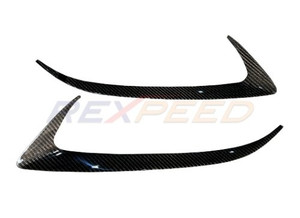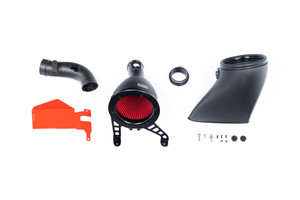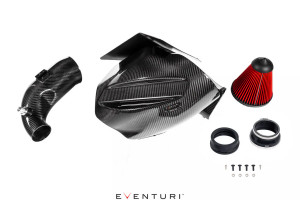GR Performance Parts is excited to offer the all new Eventuri Intake System for the GR86. Adding another Eventuri Intake System to the Toyota GR line up, this intake system is sure to provide to the largest horsepower/torque for the market!
These systems are expected to come off pre-order early September! Order yours today!
Written by Eventuri:
Performance Increase : 10-14hp, 10-11ft-lb
The GR86 Intake is a culmination of testing numerous configurations with over 125 dyno runs to arrive at an optimized design. We tested both stock and tuned cars to assess the impact of changing the intake for a less restrictive version. The NA 2.4L Boxer engine is sensitive to intake air temperatures so our initial priority was to ensure a fully sealed system. Dyno testing revealed a dip in power around 6000rpm on the stock ECU. This dip persists no matter what the intake configuration is – even with all possible restrictions removed, a higher flowing intake creates a strong engine resonance at this rpm causing a momentary dip below the stock curve. The stock airbox has a baffling effect at this rpm but then also restricts the power at the top end. By iterating our design through testing different intake lengths, single and dual duct openings and even adding baffles, we arrived at a version which minimizes the resonance dip while gaining 14hp at the top end on the stock ECU. Once the ECU is tuned we can see large mid-range gains and an elimination of the dip in power below the stock curve.
The Eventuri Difference
The GR86 Eventuri system uses our Patented Carbon fiber Housing which provides an aerodynamically efficient airflow path from the filter to the turbo. Not just another cone filter with a heat shield but a unique design which invokes the Venturi affect and maintains laminar flow conditions to reduce the drag on the turbo. You can read more about the housing design and how it works HERE.
The filter housing comprises of our bespoke generation 2 filter, aluminum inlet cowl and the integrated MAF section. The carbon pod shrouds the reverse mounted filter and smoothly shapes the airflow down to the MAF section which then connects to the rear inlet tube. This changes the flow path from the OEM airbox where airflow enters the front of the airbox, changes direction by 90 degrees to travel through the panel filter and then changes direction again by 90 degrees to move through the MAF section. Our system is a lot more direct with airflow entering the front of the filter housing and and moving into the MAF section without any abrupt direction changes. The result is a smoother path from the filter to the turbo inlet tube and therefore the turbo is able to function with less drag. To ensure a reliable seal with the MAF sensor, we use a CNC machined mount secured to the carbon housing.
The duct feeds the filter housing with ambient airflow from the front bumper/grill section. Through testing several iterations we found that a dual intake where cold air was taken from both openings in the slam panel area, functioned in the least restrictive manner. The region in the front bumper area is saturated with cold air from our scoops and also from the natural design of the OEM cavity behind the bumper. The duct has an expanding rubber seal which mates to the filter housing to ensure heated engine bay air is kept away from the intake feed, but still allows for engine movement. It is mounted in 3 positions to ensure a secure fit.
The final components are 2 front scoops which sit behind the lower grill to direct ambient air upwards into the opening of the duct. This aids in keeping IATs low while the car is in motion. For owners with aftermarket oil coolers who cannot use the scoops, the IATs will still remain minimal due to the natural saturation of cold air behind the bumper.
NOTE: Engine cover is not included in Intake System.
Each Intake System consists of:
- Carbon Fiber Patented Venturi Filter Housing with integrated MAF section
- Bespoke High Flow Dry Cone Filter
- Carbon Fiber Dual Feed Inlet Duct
- Laser Cut Front Air Scoops
- Custom Made Hardware
- Laser Cut Stainless Steel Brackets
- CNC Machined MAF Boss and Bracket Mounts
|
|
The duct feeds the filter housing with ambient airflow from the front bumper/grill section. Through testing several iterations we found that a dual intake where cold air was taken from both openings in the slam panel area, functioned in the least restrictive manner. The region in the front bumper area is saturated with cold air from our scoops and also from the natural design of the OEM cavity behind the bumper. The duct has an expanding rubber seal which mates to the filter housing to ensure heated engine bay air is kept away from the intake feed, but still allows for engine movement. It is mounted in 3 positions to ensure a secure fit.
|
|
The final components are 2 front scoops which sit behind the lower grill to direct ambient air upwards into the opening of the duct. This aids in keeping IATs low while the car is in motion. For owners with aftermarket oil coolers who cannot use the scoops, the IATs will still remain minimal due to the natural saturation of cold air behind the bumper.
|
|
Below is a dyno graph of a completely stock GR86 with just the airbox being swapped for the Eventuri intake. This was independently tested at DREAM automotive. Several runs were done with the OEM airbox to get a repeatable result and then again with the Eventuri intake. Tests were done on the same day back to back. Results show an increase in peak torque and power with a "resonance" dip between 5700-6300rpm after which the power gain amounts to 14hp as the curve crosses the stock line and continues to the RPM limit.
|
|
Below is a dyno graph of a GR86 which has been custom tuned by Paragon Performance in the USA. They tuned the car to run E85 with a closed loop fuel control to ensure fueling is identical on both the stock intake and Eventuri to remove the variability of the GR86 open loop fuel control. Paragon also tuned the ECU to eliminate the resonance issue and the results speak for themselves. All runs were carried out with the same tune and only the airbox was changed between runs. Tests were done on the same day back to back.
|
|
During development we iterated the intake and tested various configurations to arrive at the optimized version. Over 125 dyno runs were carried out and here is a visual representation of all that data.......
|
|




























